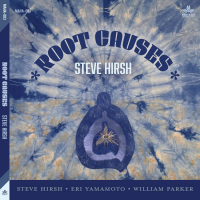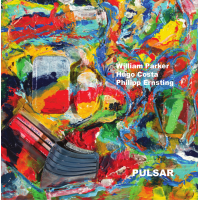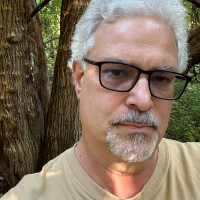Home » Jazz Musicians » William Parker
William Parker
William Parker is a musician, improviser, composer, educator, and author. He plays the bass, shakuhachi, double reeds, tuba, donso ngoni and gembri. Born in 1952 in the Bronx, New York, he studied bass with Richard Davis, Art Davis, Milt Hinton, Wilber Ware, Jimmy Garrison, and Paul West. During Parker’s prolific career, he has recorded over 150 albums, had countless celebrated stage appearances, and helped shaped the jazz scene for both his peers and the youth. In 2013, Parker received the Doris Duke Performing Artist Award in recognition of his influence and impact on the creative jazz scene over the last 40 years.
William entered the music scene in 1971, playing at Studio We, Studio Rivbea, Hilly’s on The Bowery, and The Baby Grand. By the age of 20, Parker quickly became a highly sought after bassist, playing with established musicians such as Ed Blackwell, Don Cherry, Bill Dixon, Milford Graves, Billy Higgins, and Sunny Murray. Projects with dancer and choreographer Patricia Nicholson have created a huge repertoire of composed music for multiple ensembles ranging from solo works to big band projects. In 1980, he became a member of the Cecil Taylor Unit, in which he played a prominent role for over a decade.
Since the beginning of his career, William Parker has commanded a unique degree of respect from his fellow musicians and critics alike. In 1995, the Village Voice characterized William Parker as "the most consistently brilliant free jazz bassist of all time." In addition to his work with artists in the United States, he has developed a strong relationship with musicians in the European Improvised Music scene such as Peter Kowald, Peter Brotzmann, Han Bennink, Tony Oxley, Derek Bailey, John Tchicai, Louis Sclavis, and Louis Moholo.
William Parker began recording in 1994 and founded the ensembles In Order To Survive and The Little Huey Creative Music Orchestra. In 2001, he released O’Neal’s Porch, which marked a turn toward a more universal sound working with drummer Hamid Drake. The Raining on the Moon Quintet followed, adding vocalist Leena Conquest and the Quartet from O’Neal’s Porch. Most notable among many recent projects is the Inside Songs of Curtis Mayfield.
As Steve Greenlee of the Boston Globe stated in July 2002, “William Parker has emerged as the most important leader of the current avant-garde scene in jazz.” Parker has consistently worked in many of the most important groups within this genre, including his own. He currently leads The Little Huey Creative Music Orchestra, In Order to Survive, Raining on the Moon, Stan’s Hat Flapping in the Wind, and The Cosmic Mountain Quartet with Hamid Drake, Kidd Jordan, and Cooper-Moore.
Read moreTags
John Dikeman: No Kings
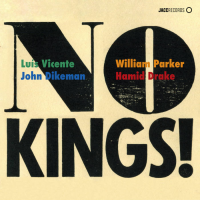
by John Sharpe
Recorded live in 2022, No Kings documents a volatile meeting between a formidable European horn partnership and American free jazz royalty. In 2015, expat American saxophonist John Dikeman initiated a trio with bassist William Parker and drummer Hamid Drake. Five years later, he invited Portuguese trumpeter Luis Vicente to join them, resulting in the quartet heard here on its second album, following Goes Without Saying, But It's Got To Be Said (JACC Records, 2020). The reedman and brass player share ...
Continue ReadingVilnius Jazz Festival 2025

by Ieva Pakalniskyte
Vilnius Jazz Festival 2025 Old Theatre of Vilnius Vilnius, Lithuania October 13-21, 2025 This report covers five days from October 15-19. The thirty-eighth edition of the Vilnius Jazz Festival opened with the assurance of an event that has spent decades refining both its aesthetic and its purpose. As one of Vilnius's most enduring festivals--shaped for almost four decades by producer Antanas Gustys--it continues to articulate a distinctive philosophy at a moment when many ...
Continue ReadingJazz & Wine of Peace 2025, Part 1

by Luciano Rossetti
A collection of photos from the Jazz & Wine of Peace in Cormons, from October 23-26, 2025. This was the first year with the new Artistic Director, Enrico Bettinello. The festival lineup featured William Parker Trio, James Brandon Lewis Quartet, Valentina Fin, Simona Severini, The Necks, Nubya Garcia Quartet, Tania Giannouli Trio, Anais Drago Trio, Silvia Bolognesi and many others. In addition, celebrated photographer Ziga Koritnik was the subject of a photo exhibition, coinciding with the publication of his book ...
Continue ReadingJazz em Agosto 2025

by Petra Cvelbar
A collection of photos from the Jazz em Agosto, in Lisbon from August 1-10, 2025 featuring William Parker, Cooper-Moore , Hamid Drake, Kris Davis, Robert Hurst, Johnathan Blake, Mariam Rezaei, Julien Desprez, Lukas König, Darius Jones, Chris Lightcap Gerald Cleaver, Luís Vicente Trio, João Próspero--Sopros, MOPCUT, Moor Mother, MC Dälek, Crystal Riley, X-Ray Hex Tet, Pat Thomas, Ahleuchatistas 3, Shane Parish, Trevor Dunn, Danny Piechocki, Thumbscrew, Elias Stemeseder & Christian Lillinger, Patricia Brennan Septet. ...
Continue ReadingIvo Perelman: Armageddon Flower
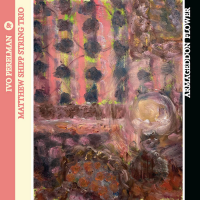
by John Sharpe
Pianist Matthew Shipp serves as the fulcrum of Armageddon Flower, a riveting quartet date that unites two longstanding units: the duo with tenor saxophonist Ivo Perelman, and his String Trio with violist Mat Maneri and bassist William Parker. However, no-one is confined by past roles. Each of these four players has collaborated in multiple configurations over the last three decades. So four known quantities perhaps, but the familiarity here breeds neither complacency nor predictability. What emerges is a daring, combustible ...
Continue ReadingIvo Perelman: Armageddon Flower

by Mike Jurkovic
Ekphrastic by design, Armageddon Flower, the forty-seventh bold, forward-thinking testament pairing saxophonist Ivo Perelman and pianist Matthew Shipp is the duo's new zenith in a tireless exploration dating back nearly thirty years. It is another view from the pinnacle of their brotherhood that includes such watermark recordings as the symbiotic Live In Nuremberg (SMP, 2019), Fruition (ESP, 2022), Magical Incantations (Soul City Sounds, 2024) and the fanciful, Brazilian flavored Bendito of Santa Cruz (Cadence, 1996) which started it all.
Continue ReadingMarshall Allen's Ghost Horizons: Live in Philadelphia

by Mark Corroto
In 2025, the Collegium Cardinalium, or College of Cardinals--a body formed in the Middle Ages--convened a conclave in Rome to elect a new Pope for the Catholic Church. Nearly five centuries before the inception of such conclaves, Tibetan Buddhists established their own process of succession by searching for the reincarnation of the Dalai Lama, often discovered in the form of a child. These spiritual traditions of succession are vital for preserving the identity, rituals and philosophies of their institutions. Each ...
Continue ReadingJazz Musician of the Day: William Parker

Source:
Michael Ricci
All About Jazz is celebrating William Parker's birthday today!
William Parker is a musician, improviser, composer, educator, and author. He plays the bass, shakuhachi, double reeds, tuba, donso ngoni and gembri. Born in 1952 in the Bronx, New York, he studied bass with Richard Davis, Art Davis, Milt Hinton, Wilber Ware, Jimmy Garrison, and Paul West. During Parker’s prolific career, he has recorded over 150 albums, had countless celebrated stage appearances, and helped shaped the jazz scene for both his ...
read more
Jazz Musician of the Day: William Parker

Source:
Michael Ricci
All About Jazz is celebrating William Parker's birthday today!
William Parker is a musician, improviser, composer, educator, and author. He plays the bass, shakuhachi, double reeds, tuba, donso ngoni and gembri. Born in 1952 in the Bronx, New York, he studied bass with Richard Davis, Art Davis, Milt Hinton, Wilber Ware, Jimmy Garrison, and Paul West. During Parker’s prolific career, he has recorded over 150 albums, had countless celebrated stage appearances, and helped shaped the jazz scene for both his ...
read more
William Parker Biography Celebration With Joe McPhee And Cisco Bradley

Source:
James Keepnews
Elysium Furnace Works is proud to present bassist, composer, bandleader and a signal figure in creative music worldwide, William Parker, as part of a celebration of the recent publication of his long-overdue biography, Universal Tonality—The Life and Music of William Parker. Written by Pratt Institute professor Cisco Bradley and published by Duke University Press, this biography has already been acclaimed as a major contribution to jazz scholarship and the sociocultural history of downtown New York City. This event—co-sponsored by Beacon, ...
read more
Jazz Musician of the Day: William Parker

Source:
Michael Ricci
All About Jazz is celebrating William Parker's birthday today!
William Parker is a musician, improviser, composer, educator, and author. He plays the bass, shakuhachi, double reeds, tuba, donso ngoni and gembri. Born in 1952 in the Bronx, New York, he studied bass with Richard Davis, Art Davis, Milt Hinton, Wilber Ware, Jimmy Garrison, and Paul West. During Parker’s prolific career, he has recorded over 150 albums, had countless celebrated stage appearances, and helped shaped the jazz scene for both his ...
read more
Jazz Musician of the Day: William Parker

Source:
Michael Ricci
All About Jazz is celebrating William Parker's birthday today!
William Parker is a musician, improviser, composer, educator, and author. He plays the bass, shakuhachi, double reeds, tuba, donso ngoni and gembri. Born in 1952 in the Bronx, New York, he studied bass with Richard Davis, Art Davis, Milt Hinton, Wilber Ware, Jimmy Garrison, and Paul West. During Parker’s prolific career, he has recorded over 150 albums, had countless celebrated stage appearances, and helped shaped the jazz scene for both his ...
read more
Jazz Musician of the Day: William Parker

Source:
Michael Ricci
All About Jazz is celebrating William Parker's birthday today!
William Parker is a musician, improviser, composer, educator, and author. He plays the bass, shakuhachi, double reeds, tuba, donso ngoni and gembri. Born in 1952 in the Bronx, New York, he studied bass with Richard Davis, Art Davis, Milt Hinton, Wilber Ware, Jimmy Garrison, and Paul West. During Parker’s prolific career, he has recorded over 150 albums, had countless celebrated stage appearances... Read more.
Place our Musician of the Day widget ...
read more
Jazz Musician of the Day: William Parker

Source:
Michael Ricci
All About Jazz is celebrating William Parker's birthday today!
As Steve Greenlee of the Boston Globe stated in July 2002, “William Parker has emerged as the most important leader of the current avant-garde scene in jazz.” He is working in many of the more important groups in this genre, some of the most prestigious being his own, i.e. The Curtis Mayfield Project, Little Huey Creative Orchestra, In Order to Survive, William Parker’s Quartet and other groups. Mr... Read more.
Place ...
read more
William Parker Quartet & In Order To Survive Double-Album To Be Released June 23 On AUM Fidelity

Source:
Steven Joerg
Meditation / Resurrection is a double-album presenting a bounty of beautiful new William Parker compositions performed by two of his flagship ensembles, the Quartet-&- In Order To Survive. It was recorded & mixed live during a one-day studio session in late 2016. This is Parker & the groups’ followup release to 2013’s epic Wood Flute Songs box set. At the core of both groups is Parker’s foundational bass together with rhythm twin, the incomparable Hamid Drake. Their partnership–two decades deep ...
read more
Jazz At Atlas Debuts In Newburgh, NY With William Parker And Evidence Of Everlasting Beauty on May 20 At 8pm

Source:
James Keepnews
“William Parker is something of a father figure.” —Larry Blumenfeld, New York Times “One of the 50 Greatest New York Musicians of All Time” —Time Out New York Launching a new series of music and cultural discourse at the Atlas Industries building in Newburgh, NY, Jazz at Atlas is proud to present the legendary bassist, composer and bandleader William Parker and the ensemble Evidence Of Everlasting Beauty. The band features Cooper-Moore on piano, Daniel Carter on reeds, trumpet and flute, ...
read more
Jazz Musician of the Day: William Parker

Source:
Michael Ricci
All About Jazz is celebrating William Parker's birthday today!
As Steve Greenlee of the Boston Globe stated in July 2002, “William Parker has emerged as the most important leader of the current avant-garde scene in jazz.” He is working in many of the more important groups in this genre, some of the most prestigious being his own, i.e. The Curtis Mayfield Project, Little Huey Creative Orchestra, In Order to Survive, William Parker’s Quartet and other groups. Mr... Read more.
Place ...
read more
Art Davis
bass, acousticRichard Davis
bass, acousticMilt Hinton
bass, acousticWilbur Ware
bass, acousticPaul West
pianoMike Bullock
bassOgnjen Savija
guitarBen Hedquist
bass, acousticShay Hazan
bassEvan Palmer
bass, acousticPatrick Golden
drumsPhotos
Music
Armageddon Flower
From: Armageddon FlowerBy William Parker
Call to Action: Concerted Effort
From: Call to Action / Call to PrayerBy William Parker
Excerpt from Cosmic Canticles
From: For Those Who Cross The SeasBy William Parker
Titan vs. Sphinx
From: Destiny CallingBy William Parker
In The Garden
From: SparksBy William Parker
Blues for Cecil No. 2
From: 2 Blues for CecilBy William Parker












